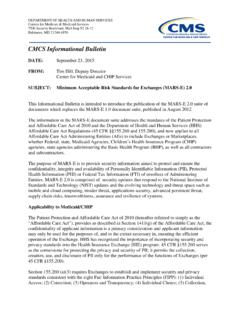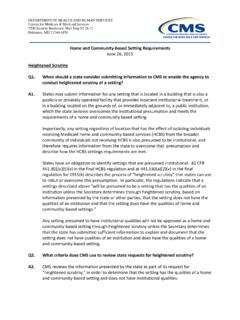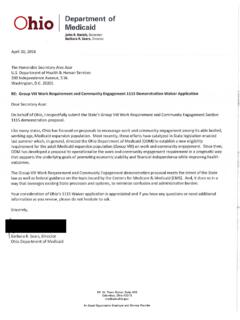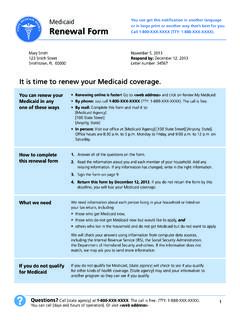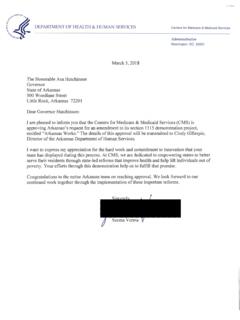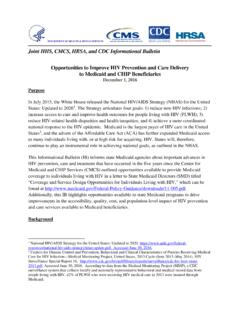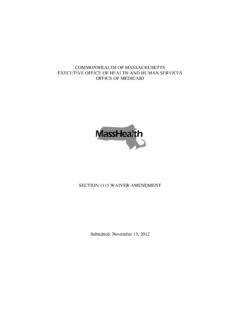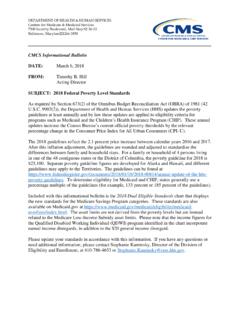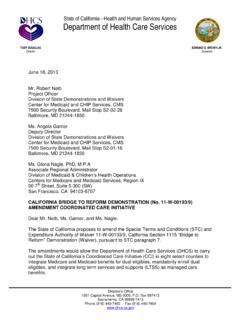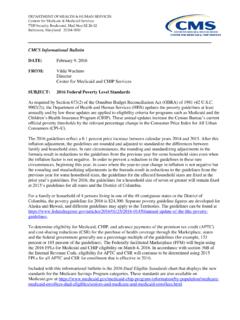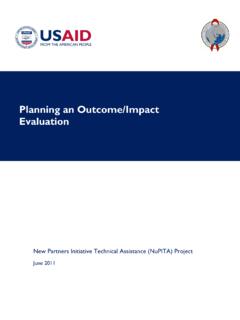Transcription of SMD # 21-005 RE: UPDATED: Mandatory Medicaid Coverage …
1 The contents of this document do not have the force and effect of law and are not meant to bind the public in any way, unless specifically incorporated into a contract. This document is intended only to provide clarity to the public regarding existing requirements under the law. DEPARTMENT OF HEALTH & HUMAN SERVICES Centers for Medicare & Medicaid Services 7500 Security Boulevard, Mail Stop S2-26-12 Baltimore, Maryland 21244-1850 SMD # 21-005 RE: UPDATED: Mandatory Medicaid Coverage of Routine Patient Costs Furnished in Connection with Participation in Qualifying Clinical Trials April 13, 2022 Dear State Medicaid Director: The Center for Medicaid and CHIP Services (CMCS) is issuing this State Medicaid Director Letter outlining new Medicaid state plan requirements for assuring Coverage of routine patient costs associated with participation in qualifying clinical trials. This guidance applies to states and territories with respect to items and services furnished to Medicaid beneficiaries, including beneficiaries enrolled in Alternative Benefit Plans (ABPs), who are participating in a qualifying clinical trial on or after January 1, 2022.
2 Background Historically, the Medicaid statute and its implementing regulations did not specify a clear requirement for Coverage of routine costs associated with clinical trials, even if those routine costs were for items and services that ordinarily would be covered by a state s Medicaid program. Therefore, states ( including the territories, unless otherwise noted) have had the flexibility to limit or exclude Coverage for routine costs associated with clinical trials by defining medical necessity criteria, provider qualifications and limits on the amount, duration, and scope of services. Some states historically have determined that all services provided to a Medicaid beneficiary participating in a clinical trial were considered experimental, and therefore not covered by Medicaid . On the other hand, we explained in guidance regarding dually eligible Medicare and Medicaid beneficiaries issued on October 30, 2000, that Medicaid may pay for otherwise covered services that are routine costs for clinical trials, provided all applicable requirements are met, including third party liability To date, this State Medicaid Director Letter is the only guidance we have issued addressing Medicaid Coverage of routine costs for clinical trials.
3 Mandatory Services Division CC, Title II, Section 210 of the Consolidated Appropriations Act, 2021 (Public Law 116-260) ( section 210) amended section 1905(a) of the Social Security Act (the Act), by adding to the definition of medical assistance a new benefit at section 1905(a)(30) for routine patient costs for items and services furnished in connection with participation by Medicaid beneficiaries 1 in qualifying clinical trials, subject to further provisions in a new section 1905(gg). Section 210 also amended s ections 1902(a)(10)(A) and 1937(b)(5) of the Act to make Coverage of this new benefit Mandatory under the state plan and any benchmark or benchmark equivalent Coverage also referred to as alternative benefit plans, or ABPs with respect to items and services furnished on or after January 1, 2022. Pursuant to section 1905(a)(30) and 1905(gg)(1) of the Act, the routine patient costs that must be covered for a beneficiary participating in a qualifying clinical trial are any item or service provided to the individual under the qualifying clinical trial, including any item or service provided to prevent, diagnose, monitor, or treat complications resulting from participation in the qualifying clinical trial, to the extent that the provision of such items or services to the beneficiary would otherwise be covered outside the course of participation in the qualifying clinical trial under the state plan or waiver, including a demonstration project under section 1115 of the Act.
4 Such routine services and costs also include any item or service required solely for the provision of the investigational item or service that is the subject of the qualifying clinical trial, including the administration of the investigational item or service. Some examples of routine costs in a clinical trial could include otherwise covered physician services or laboratory or medical imaging services that assist with prevention, diagnosis, monitoring or treatment of complications arising from clinical trial participation. Items and Services Not Covered Under the New Mandatory Benefit2 As described under section 1905(gg)(1) of the Act, r outine patient costs within the meaning of section 1905(a)(30) of the Act do not include any investigational item or service that is the subject of the qualifying clinical trial and is not otherwise covered outside of the clinical trial under the state plan, waiver, or demonstration project. Similarly, routine patient cost does not include any item or service that is provided to the beneficiary solely to satisfy data collection and analysis for the qualifying clinical trial that is not used in the direct clinical management of the beneficiary and is not otherwise covered under the state plan, waiver, or demonstration project.
5 For example, if a beneficiary has a condition that typically requires monitoring through an annual medical imaging scan and the beneficiary is participating in a clinical trial with a protocol that requires monthly medical imaging scans only to collect data on the effects of the investigational item or service, the additional monthly scans for purposes of clinical trial data collection would not be included in the beneficiary s routine patient costs to the extent they are not used for the direct clinical management of the beneficiary or are not otherwise covered under the state plan, waiver, or demonstration project. Qualifying Clinical Trial Section 1905(gg)(2) of the Act defines the term qualifying clinical trial for purposes of section 1905(a)(30) of the Act as a clinical trial in any clinical phase of development that is conducted in relation to the prevention, detection, or treatment of any serious or life-threatening disease or condition, and is described in any of clauses (i)-(iii) of section 1905(gg)(2)(A) of the Act.
6 Therefore, to meet the statutory definition, the qualifying clinical trial must also be one or more of the following: 2 This section has been updated. A study or investigation that is approved, conducted, or supported (including by funding through in-kind contributions) by one or more of the following: o The National Institutes of Health (NIH); o The Centers for Disease Control and Prevention (CDC); o The Agency for Health Care Research and Quality (AHRQ); o The Centers for Medicare & Medicaid Services (CMS); o A cooperative group or center of any of the entities described above or the Department of Defense or the Department of Veterans Affairs; o A qualified non-governmental research entity identified in the guidelines issued by the NIH for center support grants3; A clinical trial, approved or funded by any of the following entities, that has been reviewed and approved through a system of peer review that the Secretary determines comparable to the system of peer review of studies and investigations used by the NIH, and that assures unbiased review of the highest scientific standards by qualified individuals with no interest in the outcome of the review: o The Department of Energy o The Department of Veterans Affairs o The Department of Defense; A clinical trial that is one conducted pursuant to an investigational new drug exemption under section 505(i) of the Federal Food, Drug, and Cosmetic Act or an exemption for a biological product undergoing investigation under section 351(a)(3) of the Public Health Service Act; or A clinical trial that is a drug trial exempt from being required to have one of the exemptions in the prior bullet.
7 Coverage Determination Requirements As provided in section 1905(gg)(3) of the Act, a determination with respect to Coverage under section 1905(a)(30) of the Act for a beneficiary participating in a qualifying clinical trial must be expedited and completed within 72 hours and must be made without regard to the geographic location or network affiliation of the health care provider treating the beneficiary or the principal investigator of the qualifying clinical trial. This means that states must review and adjust, as necessary, any existing utilization management processes to ensure a Coverage determination is completed within 72 hours. We interpret the geographic location or network affiliation requirement to mean that a state or territory may not deny Coverage of routine patient costs based on where the clinical trial is conducted, including out of state, or based on whether the principal investigator or provider treating the beneficiary in connection with the clinical trial is outside of the network of the beneficiary s Medicaid managed care plan, if applicable.
8 In the latter case, if a positive Coverage determination is made, the state may either pay for the covered services on a fee-for-service basis as outside the scope of the managed care contract or require the managed care plan to cover the services out-of-network when the Coverage requirement applies. 3 While Section 210 of the Consolidated Appropriations Act references a qualified non-governmental research entity identified in the guidelines issued by the NIH for center support grants, NIH has clarified that no such guidelines exist. Coverage must also be based on an attestation regarding the appropriateness of the qualifying clinical trial by the health care provider and principal investigator and be made using a streamlined uniform form developed for state use by the Secretary, which is currently under development, and that will include the option to reference information regarding the qualifying clinical trial that is publicly available on a website maintained by the Secretary, such as Further, Coverage determinations must not require submission of the protocols of the qualifying clinical trial or any other documentation that may be proprietary or determined by the Secretary to be burdensome.
9 States that use a managed care delivery system must either cover the costs as required outside the scope of its managed care contracts or specify the applicable requirements in their managed care plan contracts and adjust capitation rates as appropriate for items and services furnished to Medicaid beneficiaries on or after January 1, 2022. Exemption of Additional Expenditures from Payment Limits for Territories Section 210 amended section 1108(g)(4) of the Act to include a new subparagraph (B), providing that expenditures for routine patient costs, as defined in section 1905(gg)(1), will not be taken into account in applying the allotment caps for the territories under 1108(f) of the Act. This provision is also effective for items and services furnished on or after January 1, 2022. Exception for State Legislation4 States that require legislative changes to implement Coverage of routine patient costs as specified in section 1905(a)(30) of the Act will not be regarded as failing to comply with the requirements newly added by section 210, solely on the basis of their failure to meet these requirements before the first day of the first calendar quarter beginning after the close of the first regular session of the state legislature that begins after December 27, 2020, the date of enactment of the Consolidated Appropriations Act, 2021.
10 For states that have a two-year legislative session, each year of the session is considered a separate regular session of the state legislature for purposes of this exception. Essentially, this provision provides for an extension to the required start date of the new Coverage requirement if the only reason the state cannot come into compliance by January 1, 2022 is due to lack of state legislation that is needed to meet the requirement. Not all states will be able to seek this extension, because it depends on the timing of the state s first regular legislative session that began after the date of enactment of the Consolidated Appropriations Act, 2021. If the Secretary determines that state legislation is needed to bring the state plan into compliance with the new Coverage requirement, the Secretary will not consider the state to be out of compliance with the new Coverage requirement solely on the basis of a failure to enact the required state legislation before the first day of the first calendar quarter beginning after the close of the first regular session of the state s legislature that begins after December 27, 2020.
